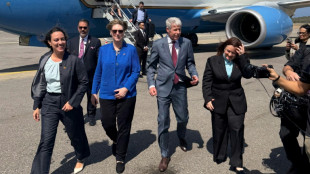
UN conference seeks boost for aid as US cuts bite

A UN conference aiming to rally fresh support for development aid begins in Spain on Monday with the sector in crisis as US-led funding cuts jeopardise the fight against poverty.
At least 50 world leaders including French President Emmanuel Macron, Kenya's William Ruto, EU chief Ursula von der Leyen and UN head Antonio Guterres will gather in the city of Seville from June 30 to July 3.
But key player the United States is snubbing the biggest such talks in a decade, underlining the erosion of international cooperation on combating hunger, disease and climate change.
South African President Cyril Ramaphosa, whose country has tried to promote Global South priorities such as debt during its presidency of the G20 club of wealthy nations, cancelled his visit for domestic political reasons.
More than 4,000 representatives from businesses, civil society and financial institutions will also attend the Fourth International Conference on Financing for Development.
UN sustainable development goals set for 2030 are slipping from reach just as the world's wealthiest countries are withdrawing funding for development programmes.
President Donald Trump's gutting of the US development agency USAID is the standout example, with Germany, Britain and France among other rich economies making cuts when faced with competing priorities such as defence.
International charity Oxfam says the cuts to development aid are the largest since 1960 and the United Nations puts the growing gap in annual development finance at $4 trillion.
More than 800 million people live on less than $3 per day, according to the World Bank, with rising extreme poverty affecting sub-Saharan Africa in particular.
Disruption to global trade from Trump's tariffs and ongoing conflicts in the Middle East and Ukraine have dealt further blows to the diplomatic cohesion necessary for concentrating efforts on helping countries escape poverty.
- 'Global development failing' -
Among the key topics up for discussion is reforming international finance to help poorer countries shrug off a growing debt burden that inhibits their capacity to achieve progress in health and education.
The total external debt of the group of least developed countries has more than tripled in 15 years, according to UN data.
A recent report commissioned by the late Pope Francis and coordinated by Nobel laureate economist Joseph Stiglitz says 3.3 billion people live in countries that fork out more on interest payments than on health.
Critics have singled out US-based bulwarks of the post-World War II international financial system, the World Bank and the International Monetary Fund, for reform to improve their representation of the Global South.
Painstaking talks in New York in June produced a common declaration to be adopted in Seville that only went ahead after the United States walked out.
The document reaffirms commitment to the UN development goals such as eliminating poverty and hunger, promoting gender equality, reforming tax systems and international financial institutions.
The text also calls on development banks to triple their lending capacity, urges lenders to ensure predictable finance for essential social spending and for more cooperation against tax evasion.
Coalitions of countries will seek to spearhead initiatives in addition to the so-called "Seville Commitment", which is not legally binding.
The document shows the world can tackle the financial challenges standing in the way of achieving the development goals "and that multilateralism can still work", said Chola Milambo, Zambia's permanent representative to the United Nations.
But campaigners have criticised the text for lacking ambition and have rung alarm bells about rising global inequality.
"Global development is desperately failing because... the interests of a very wealthy few are put over those of everyone else," said Amitabh Behar, executive director of Oxfam International.
F.Young--SFF

 London
London

 Manchester
Manchester
 Glasgow
Glasgow
 Dublin
Dublin
 Belfast
Belfast
 Washington
Washington
 Denver
Denver
 Atlanta
Atlanta
 Dallas
Dallas
 Houston Texas
Houston Texas
 New Orleans
New Orleans
 El Paso
El Paso
 Phoenix
Phoenix
 Los Angeles
Los Angeles



